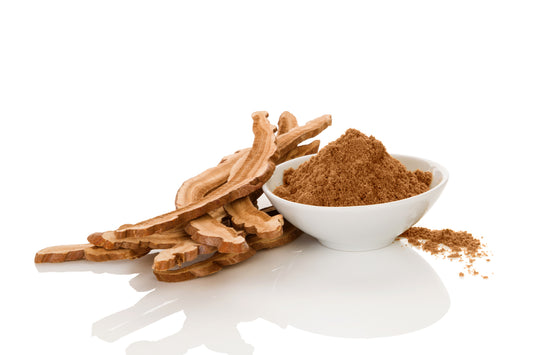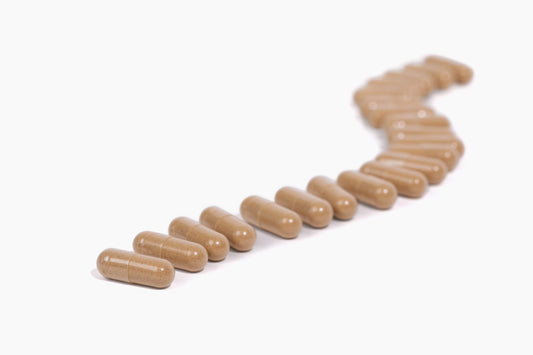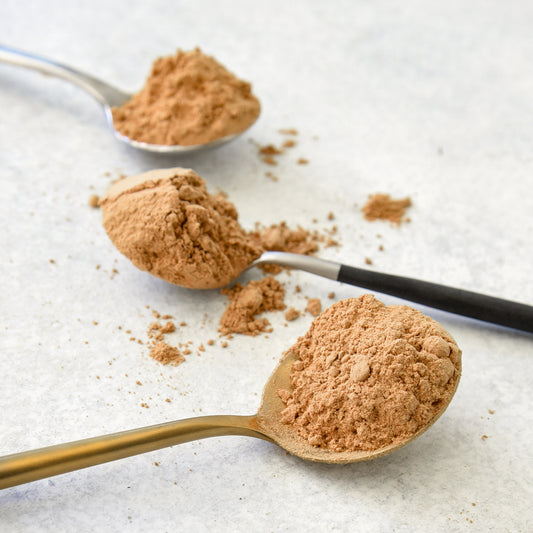As mushroom species, shiitake and maitake have many things in common. They both have the distinction of being prized as culinary mushrooms. In addition, they have been used in traditional medicine in Asia for hundreds of years. These fungi offer nutrients as well as bioactive compounds that support a variety of health and wellness goals.‡ For this reason, they are considered functional mushroom superfoods.
One of their most unique characteristics is the capacity to support our body’s ability to counteract unhealthy aspects of our lifestyles, including stress and poor diet.‡ Perhaps you have heard about their benefits and are wondering which of these functional mushrooms has the most to offer you. By comparing the health benefits, it is possible to determine which one best supports your goals. Maitake vs. shiitake—let’s see how they stack up.
An Introduction to Maitake and Shiitake Mushrooms
Though there are more than ten thousand species of mushrooms throughout the world, only a small number are regarded as functional mushrooms. With centuries of medicinal use, there is plenty of anecdotal evidence of their advantages. Interestingly, maitake and shiitake are two species that also have plenty of modern scientific research to support their benefits.
Maitake
Maitake, known scientifically as Grifola frondosa, have a rippled, fan-like structure. They have a rich, woodsy flavor. Maitake mushrooms are delicious when sauteed in butter or oil, adding a distinct aroma and rich flavor to a variety of dishes.
The optimal growing conditions for maitake are found in the temperate northern forests of Asia and Europe. They are also found growing at the base of oak trees in the eastern US and Canada where they are known as hen of the woods or sheep’s head mushrooms. While maitake were once plentiful in the wild, foraging and land development began to limit their availability. Fortunately, maitake mushrooms are now successfully cultivated commercially at indoor growing facilities.
Shiitake
Shiitake, or Lentinus edodes, has the characteristic mushroom shape with a curved stem and an open umbrella-shaped cap with gills underneath. As an edible mushroom, shiitake has a meaty texture and a rich, woodsy taste when cooked. The caps add an umami element to stir-fries, pastas, stews, and soups. Though the stems are too tough to eat, they contribute flavor when steeped in stocks and soups.
The shiitake mushroom grows naturally in the warm, humid climate of southeast Asia. While it has been cultivated in China and Japan for hundreds of years, it is now also grown in the US. In controlled growing environments, the optimal conditions for shiitake can be maintained. In addition, indoor cultivation under the supervision of expert mycologists allows for mushroom cultures free from environmental toxins and pollutants.
Maitake vs. Shiitake: A Comparison of Benefits
As edible mushrooms, these nutritious fungi offer a low-calorie source of protein and B vitamins which support the nervous system and help to provide energy by breaking down proteins, lipids, and carbohydrates. Mushrooms have been found to contain a bioavailable form of vitamin B12, as well as copper, a mineral that supports red blood cells, healthy bones, and nerves.
Micronutrients are important for health and wellness. Shiitake and maitake provide a source of selenium and ergothioneine, two antioxidants that support the body in protecting itself against the effects of oxidative stress. Researchers compared the diets of those who consumed mushrooms with those who did not and found a higher intake of many nutrients and a better diet quality in those who included mushrooms.
Though maitake and shiitake mushrooms have many things in common, each supports the body through its characteristic bioactive substances. Maitake is especially high in antioxidants, including ergothioneine, and contains proteins, glycoproteins, and powerful polysaccharides. Shiitake contains eritadenine, immuno-supportive lentinan, polysaccharides, and polysaccharopeptides. The prebiotic fiber contained in both maitake and shiitake support the growth of beneficial bacteria in the digestive system.‡
Health and Wellness Benefits of Maitake and Shiitake Mushrooms
|
Maitake Mushrooms |
Shiitake Mushrooms |
|
|
One animal research study showed that the strongest immune support came from the combined use of maitake and shiitake. Maitake alone provided the next strongest response followed by shiitake alone.
Finding Quality Mushroom Products
While comparing maitake vs. shiitake it is important to keep in mind that deriving the most benefits from both of these mushroom species requires regular consumption and the dosage amount is important. A teaspoon of single-species powder contains 2,000mg—a recommended daily dose. One of the easiest and most convenient ways to have daily access is with an organic mushroom powder. This type of product can be stirred into a beverage or soup, or it can be incorporated into a recipe to take advantage of the umami flavor profiles of these exceptional, culinary mushrooms.
Just as functional mushrooms accumulate nutrients as they grow, they can also absorb toxins from their growing environment. For this reason, it is important to know where and under what conditions your mushrooms were grown. Om Mushroom grows both species at their indoor farm in Carlsbad, California with the whole production process conducted under the strictest standards. Each contains the full-spectrum life cycle including mycelial biomass and fruit body or primordia (baby fruit body). This provides you with the full range of nutrients and bioactive compounds that each species has to offer.
Fortunately, the nutrition and benefits of these superfood mushroom species are readily available in a powder made from organic mushrooms. Supplementing your diet with the regular inclusion of maitake or shiitake is easy with quality products in user-friendly form. For optimal health benefits, particularly strong immune support, you may wish to add both of these superfood mushroom species to your daily diet.
- This can be conveniently accomplished by the inclusion of Om Mushroom’s Master Blend Organic Mushroom Powder into your daily health routine. Just one level scoop each day in a smoothie or soup provides you with the power of 10 mushroom species and three botanical adaptogens. (Note: When taking into account dosage, the Master Blend contains only 200mg of each of the 10 species.)
- To enjoy the unique flavors of shiitake and maitake in a functional beverage, try Om’s Mighty Mushroom Broth. This delicious and nutritive broth combines both species with four additional mushrooms in convenient single-serving sachets.
- For a specially curated blend that supports beauty and weight management, Om’s Beauty Blend Organic Mushroom Powder combines shiitake and maitake with three additional mushroom species. Just a teaspoonful of this whole food mushroom powder adds antioxidant power to your latte or matcha each day.
These convenient and tasty ways to get the benefits of both species make the maitake vs. shiitake question a moot point. You cannot go wrong with either of these superfood mushrooms, but regular consumption of both gives your body the most support for overall health and wellness.‡
[CTA]
‡These statements have not been evaluated by the Food and Drug Administration. Functional mushroom products are not intended to diagnose, treat, cure or prevent any disease.













